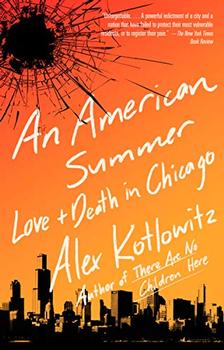Summary | Excerpt | Reviews | Beyond the Book | Readalikes | Genres & Themes | Author Bio

Love and Death in Chicago
by Alex Kotlowitz
This is what Pharoah was up against – and what we were up against, as well. Pharoah got kicked out of the boarding school for selling marijuana, and eventually graduated from our local public school. He was accepted at Southern Illinois University and had decided not to visit New York with us during this summer trip because he wanted to get ready for school. Classes began the following week. And then I got this call.
I knew the detective, Anne Chambers, from my time reporting There Are No Children Here. Anne, whom everyone in the neighborhood called Mary (for reasons I never could discern), had been a member of the plainclothes tactical unit in the neighborhood, and had a reputation as a fair-minded officer. She was tough, but cared deeply about the kids. She was a single mother, and we use to talk about her son, who at the time was headed off to Harvard with ambitions to be a police officer. She pleaded with him to do something different.
Here's what she told me in that short midnight phone call: Pharoah had taken a taxi from our house to his mother's home on the West Side, and when the cab pulled up two young men pulled Pharoah out of the backseat, and then jumped in. One of them held a pistol to the cabbie's head, demanding his money. The cabbie must have panicked, and when he pressed down on the accelerator one of the assailants shot him in the back. Anne told me that some detectives suspected Pharoah might have set up the driver. Fortunately, Anne knew Pharoah from her time in the projects, and knew that he wasn't that type of kid. I told her I, too, couldn't fathom Pharoah pulling such a stunt – though privately I worried that maybe his brother had put him up to it.
By the next morning, Anne and her colleagues had determined that in fact Pharoah knew nothing of the robbery. Pharoah's sister saw much of what transpired, and could identify the assailants. For my part, I tried to reach Pharoah. This was before cell phones. His mother said he was out, but wasn't sure where. I tried calling regularly throughout the day. Both Maria and I were concerned. He'd just seen someone murdered. It wasn't the first time, I knew, but I also imagined how disorienting it must be. Morning came and went. As did the afternoon. Finally, that evening I reached him at our house.
Where have you been? I asked.
Shopping.
Shopping?
At Marshall Field's. For school.
Shopping? I was incredulous.
Yeah.
Pharoah, how are you doing?
Okay. Why?
Why? You just saw someone murdered.
I'm okay. I got to go. I need to get packed for school.
I hung up, shaking my head. I was dumbfounded – and angry. How could he not be grieving? How could he not be upset? Shopping? I told my wife if it was me, I'd be curled up on our couch in a fetal position. I thought to myself, something must be terribly wrong with Pharoah. How can you not feel? How can you not cry? How can you not express gratitude for not getting killed yourself? Pharoah gets yanked out of the backseat of a taxi by two men with a pistol, and then watches as they shoot and kill someone he'd just shared time with. Something, I thought, was off. Out of kilter. And for the longest time, I thought Pharoah was without heart, that he'd become hardened if not numb to the violence around him. This of course is the mistake we all make, thinking that somehow one can get accustomed to it.
I feel like I've been working my way to this book for a long while. In reporting There Are No Children Here, it was the violence that most unmoored me. Since the publication of the book in 1991, four of the kids I befriended have since been murdered, including Pharoah's nephew whom even at the age of 21 everyone called Snugs, short for Snuggles. He was killed in retaliation for someone else getting shot; he was the last person murdered before the Henry Horner Homes were razed. Another young man, Jojo Meeks, had joined me, along with Pharoah and his brother Lafeyette, on a fishing trip one summer. He had a smile so wide you felt like you could just walk right in. Jojo became a stick-up artist, of drug dealers mostly, and was killed when he tried to rob some drug dealers with a bb gun. They were better armed.
Excerpted from An American Summer by Alex Kotlowitz. Copyright © 2019 by Alex Kotlowitz. All rights reserved. No part of this excerpt may be reproduced or reprinted without permission in writing from the publisher.




It is among the commonplaces of education that we often first cut off the living root and then try to replace its ...
Click Here to find out who said this, as well as discovering other famous literary quotes!
Your guide toexceptional books
BookBrowse seeks out and recommends the best in contemporary fiction and nonfiction—books that not only engage and entertain but also deepen our understanding of ourselves and the world around us.